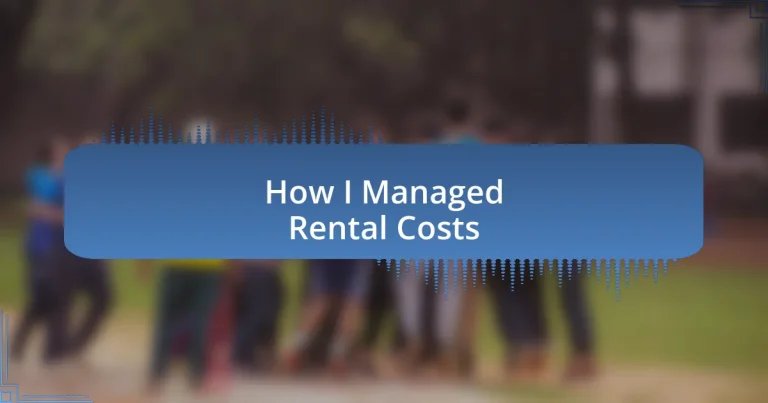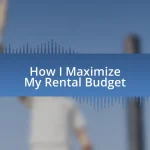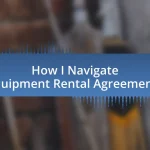Key takeaways:
- Understanding all rental costs, including utilities and maintenance fees, is crucial for effective budgeting.
- Negotiating rental agreements can lead to lower monthly expenses if approached with preparation and confidence.
- Utilizing government assistance programs and community resources can significantly reduce rental costs.
- Regularly assessing your budget and living situation is key to adapting to financial challenges and making informed decisions.
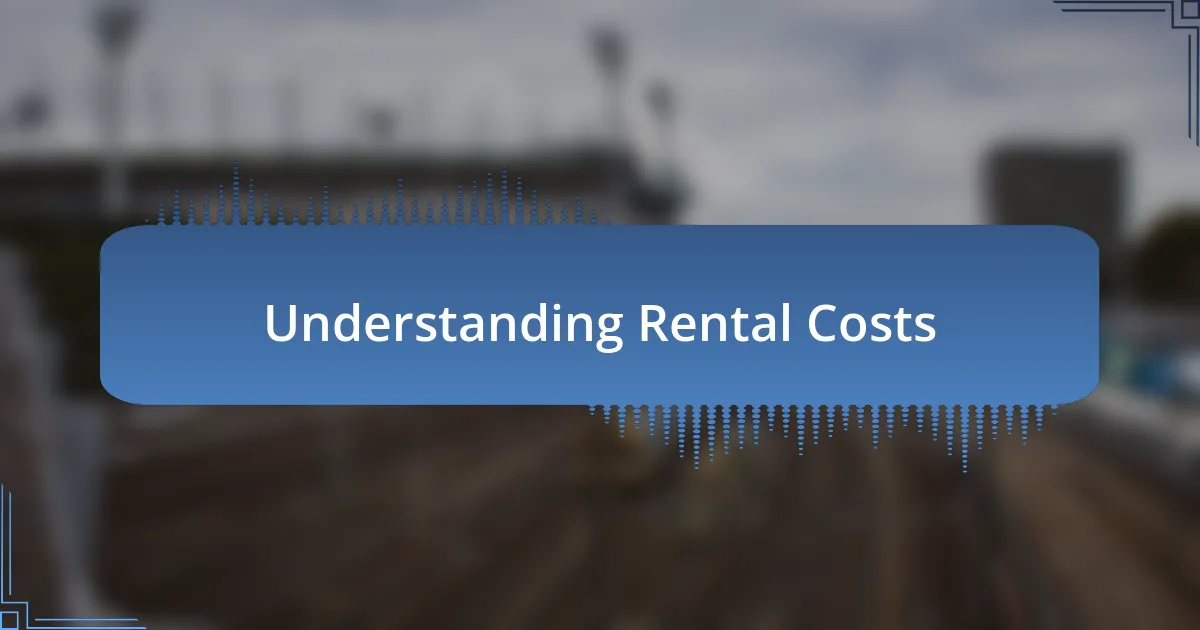
Understanding Rental Costs
When I first started renting, I was taken aback by how many different factors influenced rental costs. It wasn’t just about the rent itself; there were additional charges like utilities, maintenance fees, and sometimes even parking costs. Have you ever suddenly realized that your budget doesn’t account for all those little extras? I certainly did, and it led to some stressful months.
One of the biggest surprises for me was how location affected rental prices. When I moved to a neighborhood closer to work, I thought the trade-off would be worth it. However, the rent was significantly higher, and it made me wonder: is convenience truly worth the extra cost? Reflecting on that, I learned to weigh not just convenience, but also the long-term implications on my budget.
As I navigated through various listings, I noticed how seasonal trends impacted pricing. For instance, I discovered that rental prices often surge during summer months when demand peaks. This realization prompted me to time my searches strategically. Have you ever thought about how timing can save you money? It certainly did for me, helping me make informed decisions and ultimately find a more affordable option.

Assessing Your Current Situation
To effectively assess your current rental situation, I found it tremendously helpful to create a clear overview of all my expenses. I made a simple chart detailing my income against my expenses, highlighting rent, utilities, and other fees. This visual representation was eye-opening, as it revealed how much I was spending relative to my earnings. Have you ever created a budget plan and felt the weight of those numbers? I know I did, and it pushed me to reconsider some spending habits I thought were harmless.
One significant aspect that often goes overlooked is the condition of your rental unit. I remember when I moved into a place that seemed perfect on the surface, but deeper inspection revealed ongoing maintenance issues. This experience taught me that renting isn’t just about monthly payments; it’s vital to account for what I might need to invest in repairs and upkeep. Have you lived in a place that seemed great but had hidden problems? Those initial impressions can be deceptive, and I learned the hard way.
When reviewing my current rental situation, I also took a good look at my lifestyle needs. For instance, the amenities that came with my unit initially seemed luxurious, but I realized they rarely influenced how I lived daily. This introspection helped me identify areas where I could downsize or compromise without sacrificing my quality of life. Have you evaluated your essential needs versus nice-to-haves in your living space? It can be enlightening and ultimately lead to savings.
| Expense Category | Monthly Cost |
|---|---|
| Rent | $1,200 |
| Utilities | $200 |
| Maintenance Fees | $100 |
| Parking Cost | $50 |
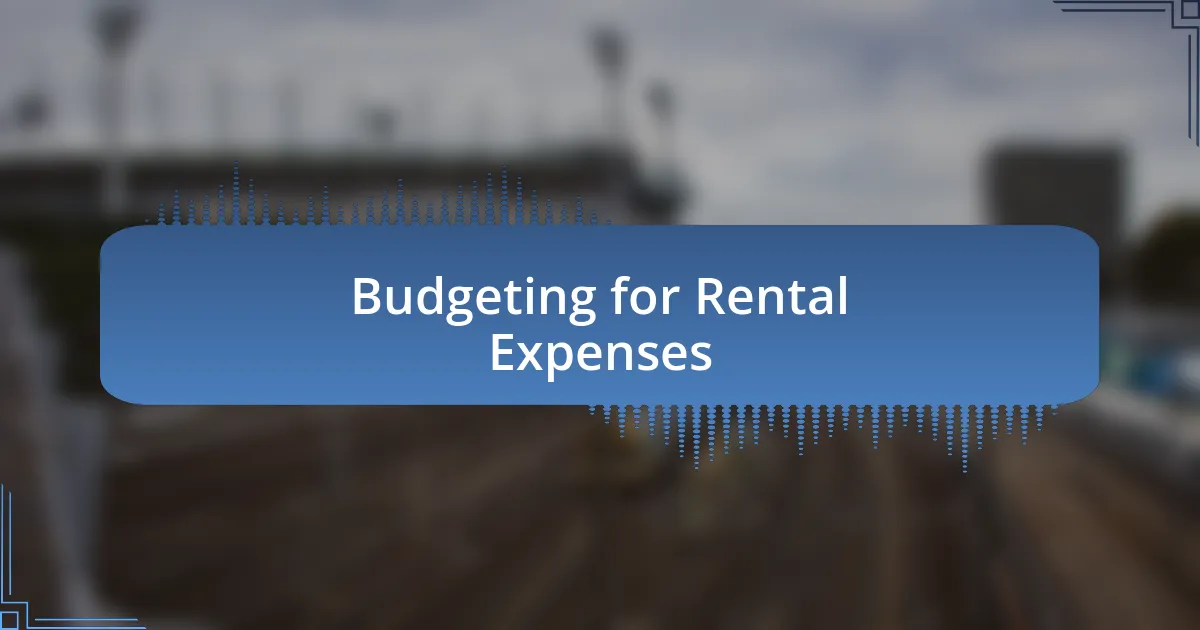
Budgeting for Rental Expenses
When it comes to budgeting for rental expenses, I found that breaking down my costs into clear categories made a world of difference. During one particularly tight month, I realized I hadn’t accounted for some incidental fees, like the yearly maintenance and parking costs. This oversight caused a minor panic but also served as a valuable lesson. I now ensure to include these in my budget from the start; it feels good to avoid any surprises.
Here are essential categories to consider when budgeting for rental expenses:
- Rent: Regular monthly payment
- Utilities: Electricity, water, gas, and internet
- Maintenance Fees: Any homeowner’s association fees or repairs
- Parking: Monthly or yearly parking passes
- Renter’s Insurance: Protection for your belongings
- Unexpected Repairs: Allocate for emergencies or urgent fixes
By keeping a detailed budget, I’m able to stay ahead of these costs and minimize stress. It’s all about planning ahead, right?
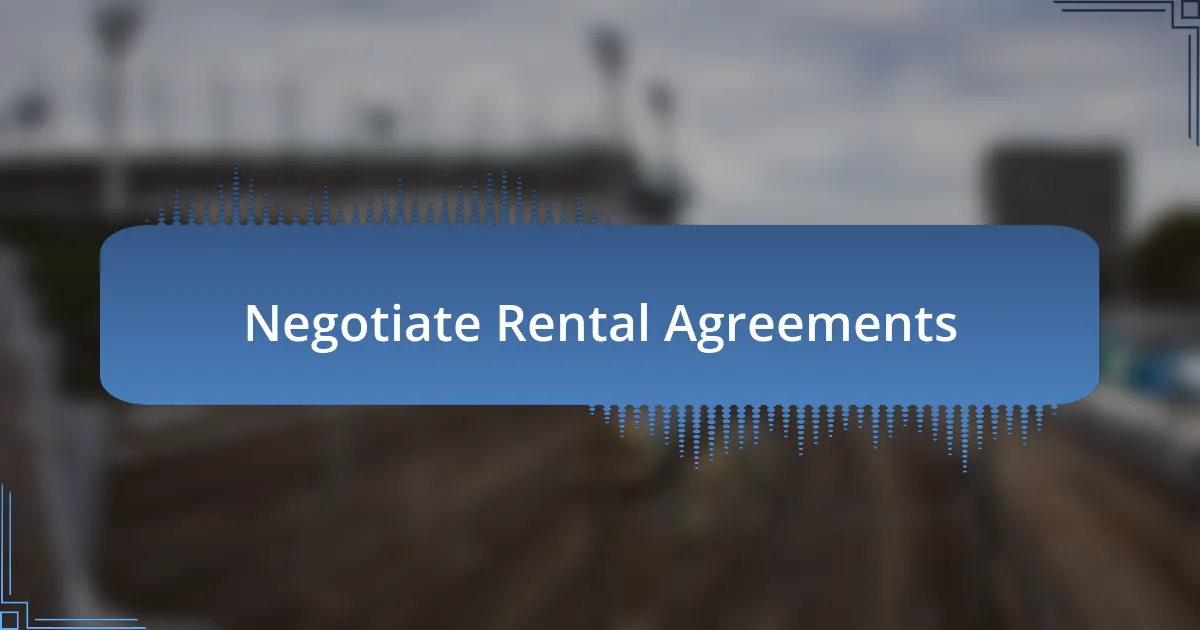
Negotiate Rental Agreements
Negotiating rental agreements can feel daunting, but it doesn’t have to be. When I first moved into my apartment, I hesitated to discuss the rent because I feared offending the landlord. However, after doing some research on comparable properties in the area, I confidently approached my landlord and presented my findings. To my surprise, they were open to adjusting the rent slightly, making my monthly expenses much more manageable.
I’m a firm believer that preparation is key. Before entering into negotiations, I always write down my priorities and non-negotiables. For instance, when I was eyeing a new place, I knew I wanted a lower deposit. By expressing this clearly and backing it up with reasons, I managed to secure a significant reduction. Have you ever felt that your needs were not being heard? Advocating for yourself in these situations is crucial, as it often leads to a better outcome.
Moreover, it’s important to foster a friendly yet professional rapport with your landlord. During one negotiation, I made it a point to highlight my reliability as a tenant, showcasing my history of timely payments. In return, we ended up discussing not just the price but also potential perks, like early access to certain amenities. Building that connection made the negotiation process feel more collaborative, allowing us both to leave the table satisfied.

Finding Cost Saving Opportunities
Finding ways to save on rental costs often involves a keen eye and some creative thinking. I remember when I discovered that many landlords would prefer a longer lease in exchange for a lower monthly rent. When I signed my first year-long lease, I broached the subject of extending it right away, which made my landlord more open to negotiating a reduced rate for my commitment. Have you thought about how such a relationship can yield tangible benefits?
Another avenue I’ve found fruitful is exploring available incentives or promotions, especially in competitive markets. When I started researching different neighborhoods, I stumbled upon a block of apartments where the manager offered free months of rent for referring a friend. Not only did I save money that way, but I also connected with a great roommate. Isn’t it interesting how sometimes, the simplest tactics can lead to significant financial relief?
Lastly, I wholeheartedly believe in the power of seeking out hidden costs in your lease. During my previous rental agreement, I noticed the utility charges added up quickly. After a chat with fellow tenants, I learned that selecting a specific energy provider could yield savings. This kind of proactive inquiry not only helped me lower expenses but also fostered a sense of community with my neighbors. Have you ever considered how your living environment can play a role in your overall budget?
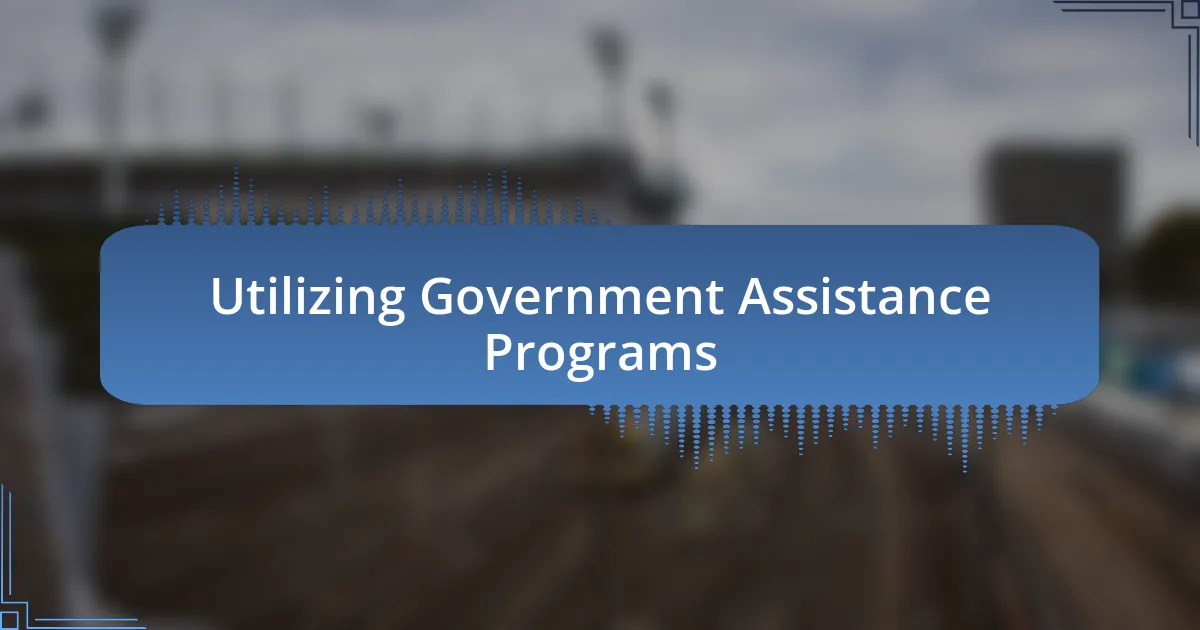
Utilizing Government Assistance Programs
Utilizing government assistance programs can significantly alleviate rental costs, and I wish I had explored this option earlier. When I finally looked into available state and federal programs, I discovered housing vouchers that could cover a portion of my rent. The application process felt daunting at first, but once I was approved, receiving that monthly financial help made all the difference in my ability to budget for other necessities. Have you ever wondered how a simple form could change your financial outlook?
In my experience, many overlooked initiatives can provide resources for those who qualify. For instance, I stumbled upon a local program aimed at helping first-time renters with security deposits. After participating in an informational session, I learned about grants that didn’t require repayment. That assistance not only eased the initial burden of moving but also allowed me to invest in a few essentials for my new place. Isn’t it empowering to know that support is available if you just take the time to research?
I’ve also found that community organizations often work in tandem with government programs to help residents navigate resources. A friend of mine was struggling with her rent after losing her job, and she was hesitant to seek help. Ultimately, she connected with a local nonprofit that helped her identify eligibility for several funding options. Watching her regain her footing was a profound reminder of the importance of community support. Have you considered reaching out to local organizations that might be able to guide you through available assistance?

Evaluating Your Long Term Strategy
Monitoring your long-term strategy for managing rental costs can help you stay ahead of unforeseen financial challenges. For instance, I’ve learned to regularly assess my budget and make adjustments as needed. This practice has kept me grounded and less stressed about sudden price increases or unexpected expenses.
If you haven’t taken the time to evaluate your goals, now is the perfect moment to do so. I remember when I set aside time each quarter to reflect on my housing situation. I realized that my living arrangements no longer met my needs, which led me to move to a more affordable area. It might seem daunting, but asking the right questions about your living situation now can save both time and money in the future.
Utilizing tools like tracking apps can genuinely help in this process. I once tried budgeting apps to visualize my expenses, and it was eye-opening! I not only saw where I was overspending but also identified areas where I could cut back, allowing me to save and reinvest in experiences rather than just paying rent. Have you thought about how a simple app could change the way you approach your living expenses?
